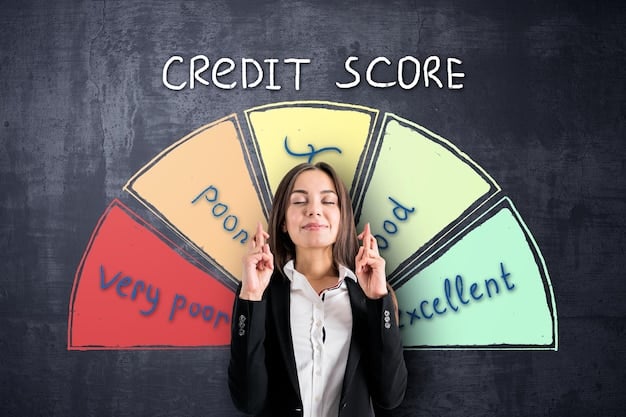Student Loan Debt & Credit Score: US Impact Explained

The Impact of Student Loan Debt on Your Credit Score: What You Need to Know is crucial for understanding how managing student loans affects creditworthiness in the US. This article explores various factors influencing credit scores, repayment strategies, and long-term financial health in the context of student loans.
Navigating the world of student loans can feel overwhelming, especially when considering its impact on your financial future. Understanding the impact of student loan debt on your credit score: What you need to know is essential for responsible financial planning in the US. This article helps you understand all of that.
Understanding the Basics of Credit Scores and Student Loans
Credit scores are an essential part of financial health, influencing everything from loan interest rates to apartment rentals. Student loans, being a significant financial obligation, play a crucial role in shaping these scores. Let’s delve into the fundamental aspects of credit scores and how student loans fit into the equation.
Understanding the relationship between your student loans and your credit score is paramount for maintaining a healthy financial profile. It’s not just about having a good score; it’s about understanding what factors contribute to it, especially concerning student loans in the US.
What is a Credit Score?
A credit score is a three-digit number that reflects your creditworthiness. It’s based on your credit history, including the number of open accounts, total levels of debt, and repayment history. In the US, the most commonly used credit scores are FICO and VantageScore.
How Student Loans Affect Your Credit Score
Student loans can impact your credit score positively or negatively, depending on how you manage them. On-time payments can boost your score, while missed payments can significantly harm it. The credit bureaus look at your payment history, outstanding debt, and the length of your credit history to determine your score.
- Payment History: Consistent on-time payments demonstrate reliability.
- Debt Burden: High student loan balances can increase your debt-to-income ratio.
- Length of Credit History: The longer your credit history, the more data is available for scoring.

In summary, student loans are a double-edged sword when it comes to credit scores. Responsible management can lead to a stronger credit profile, while mismanagement can have lasting negative consequences.
Positive Impacts of Student Loan Repayment on Credit Score
While student loan debt can feel like a burden, responsible repayment can positively influence your credit score. Making timely payments and managing your loan effectively can demonstrate financial responsibility to lenders. Let’s explore the various ways student loan repayment can boost your credit score.
Understanding the positive impacts of student loan repayment can motivate borrowers to prioritize their payments which is good for their credit.
Building a Positive Payment History
A consistent record of on-time payments is one of the most significant factors in improving your credit score. Each successful payment shows lenders that you are a reliable borrower. Setting up automatic payments can help ensure you never miss a due date.
Diversifying Your Credit Portfolio
Having a mix of different types of credit accounts, such as student loans, credit cards, and mortgages, can positively impact your credit score. Student loans add to this diversification, especially when managed responsibly.
Managing your student loans effectively contributes to a stronger and more trustworthy credit profile, paving the way for future financial opportunities.
Negative Impacts of Student Loan Debt on Credit Score
Failing to manage student loan debt can have detrimental effects on your credit score. Late payments, defaults, and high debt-to-income ratios can significantly lower your creditworthiness. Let’s examine the potential negative impacts of student loan debt and how to avoid them.
Understanding the negative impacts of student loan debt is essential for taking proactive measures to protect your credit score.

Late Payments and Defaults
Late payments are a major red flag for lenders. Even a single missed payment can lower your credit score. Defaulting on a student loan, which typically occurs after several months of non-payment, can have a severe and long-lasting negative impact.
Increased Debt-to-Income Ratio
A high debt-to-income ratio (DTI) indicates that a significant portion of your income goes towards debt payments. This can make it more difficult to qualify for new credit, such as a mortgage or auto loan. High student loan balances contribute to a higher DTI.
Impact on Credit Utilization
Credit utilization, which is the amount of credit you’re using compared to your total available credit, primarily applies to revolving credit accounts like credit cards. However, large student loan balances can indirectly affect your overall credit capacity and perception of your financial health.
- Set Up Payment Reminders: Use calendars or apps to remind you of due dates.
- Explore Income-Driven Repayment Plans: These plans can lower your monthly payments.
- Communicate with Your Lender: If you’re struggling, reach out to your lender for assistance.
Avoiding these pitfalls requires diligent management and proactive communication with your lender. Taking these steps can help you safeguard your credit score while managing your student loan obligations.
Strategies for Managing Student Loan Debt and Improving Credit Score
Successfully managing student loan debt is not just about avoiding negative impacts; it’s also about actively improving your credit score. Several strategies can help you navigate repayment while boosting your creditworthiness. Let’s explore some effective approaches.
Implementing these strategies can empower borrowers to take control of their student loan debt and enhance their credit profiles.
Income-Driven Repayment Plans
Income-driven repayment (IDR) plans are designed to make student loan payments more affordable by basing the monthly payment on your income and family size. These plans can prevent missed payments and defaults, thus protecting your credit score. Examples include Income-Based Repayment (IBR), Pay As You Earn (PAYE), and Revised Pay As You Earn (REPAYE).
Student Loan Consolidation
Consolidating your federal student loans can simplify repayment by combining multiple loans into a single loan with a fixed interest rate. While consolidation itself doesn’t directly improve your credit score, it can make managing payments easier and prevent missed due dates.
Refinancing Student Loans
Refinancing involves taking out a new loan to pay off your existing student loans, ideally at a lower interest rate. This can lower your monthly payments and save you money over the long term. However, refinancing federal student loans into private loans means losing access to federal protections like IDR plans and loan forgiveness programs.
- Regularly Monitor Your Credit Report: Check for errors and discrepancies that could harm your score.
- Pay More Than the Minimum: If possible, paying extra can reduce your principal balance faster.
- Avoid Taking on More Debt: Limit new credit applications while paying off student loans.
By implementing these strategies, you can effectively manage your student loan debt and build a stronger credit profile. It’s about making informed decisions and taking proactive steps to secure your financial future.
The Long-Term Effects of Student Loan Debt on Financial Health
The impact of student loan debt extends far beyond credit scores, influencing various aspects of your long-term financial health. Understanding these long-term effects can help you make informed decisions about borrowing and repayment. Let’s explore how student loans can shape your financial future.
Recognizing the long-term effects of student loan debt can motivate borrowers to prioritize their financial well-being and implement effective management strategies.
Impact on Homeownership
High student loan balances can make it more difficult to qualify for a mortgage. Lenders consider your debt-to-income ratio when assessing your ability to repay a home loan. A significant portion of your income going towards student loan payments can reduce your borrowing power.
Effects on Retirement Savings
Student loan debt can also hinder your ability to save for retirement. The money you spend on loan payments could otherwise be invested in retirement accounts, compounding over time. Delaying retirement savings can have a substantial impact on your long-term financial security.
Influence on Investment Opportunities
Beyond retirement, student loan debt can limit your ability to pursue other investment opportunities. Whether it’s investing in stocks, real estate, or starting a business, having less disposable income due to loan payments can restrict your financial flexibility.
Address and navigate these challenges to secure a brighter and more stable financial future despite the burden of student loan debt.
Seeking Professional Advice and Resources for Student Loan Management
Managing student loan debt can be complex, and seeking professional advice can provide valuable guidance. Various resources are available to help borrowers navigate repayment options and improve their financial literacy. Let’s explore the benefits of seeking professional assistance and the resources available.
Seeking professional advice and utilizing available resources can empower borrowers to make informed decisions and effectively manage their student loan debt.
Financial Advisors and Credit Counselors
Financial advisors can provide personalized advice on managing your student loan debt in the context of your overall financial situation. Credit counselors can help you create a budget, negotiate with lenders, and develop a debt management plan.
Non-Profit and Government Resources
Several non-profit organizations and government agencies offer free or low-cost resources for student loan borrowers. The U.S. Department of Education provides information on repayment options, loan consolidation, and loan forgiveness programs. Organizations like the National Foundation for Credit Counseling (NFCC) offer credit counseling services.
Online Tools and Calculators
Numerous online tools and calculators can help you estimate your monthly payments under different repayment plans, calculate the total cost of your loans, and assess the impact of various repayment strategies. These tools can be valuable for making informed decisions about your student loan debt.
- Student Loan Servicers: Your loan servicer can provide information on your loan balance, interest rate, and repayment options.
- Debt Management Courses: These courses can improve your financial literacy and provide strategies for managing debt.
- Legal Aid: If you’re facing legal issues related to your student loans, consider seeking assistance from legal aid organizations.
| Key Point | Brief Description |
|---|---|
| 📊 Credit Scores | Influenced by student loan management. |
| ⚠️ Late Payments | Can severely damage credit scores. |
| ✅ On-Time Payments | Boost credit scores significantly. |
| 💰 IDR Plans | Help manage payments based on income. |
Frequently Asked Questions
▼
Student loans impact your credit score based on your payment behavior. On-time payments can improve your score, while late or missed payments can lower it. Defaulting on a loan has the most severe negative impact.
▼
An income-driven repayment (IDR) plan sets your monthly student loan payment based on your income and family size. These plans can make payments more manageable and prevent defaults, protecting your credit.
▼
Consolidating your loans does not directly improve your credit score. However, it simplifies repayment by combining multiple loans into one, which can help you avoid missed payments and potential negative impacts.
▼
If you’re struggling to make payments, contact your loan servicer immediately. Explore options like income-driven repayment plans, deferment, or forbearance to find a manageable solution and avoid defaulting on your loan.
▼
You should check your credit report at least once a year to ensure there are no errors or discrepancies related to your student loans. Monitoring your credit helps you catch issues early and take corrective action if needed.
Conclusion
Understanding the impact of student loan debt on your credit score: What you need to know. By proactively managing your loans and making informed financial decisions, you can protect and even improve your credit health while working towards a secure financial future.





